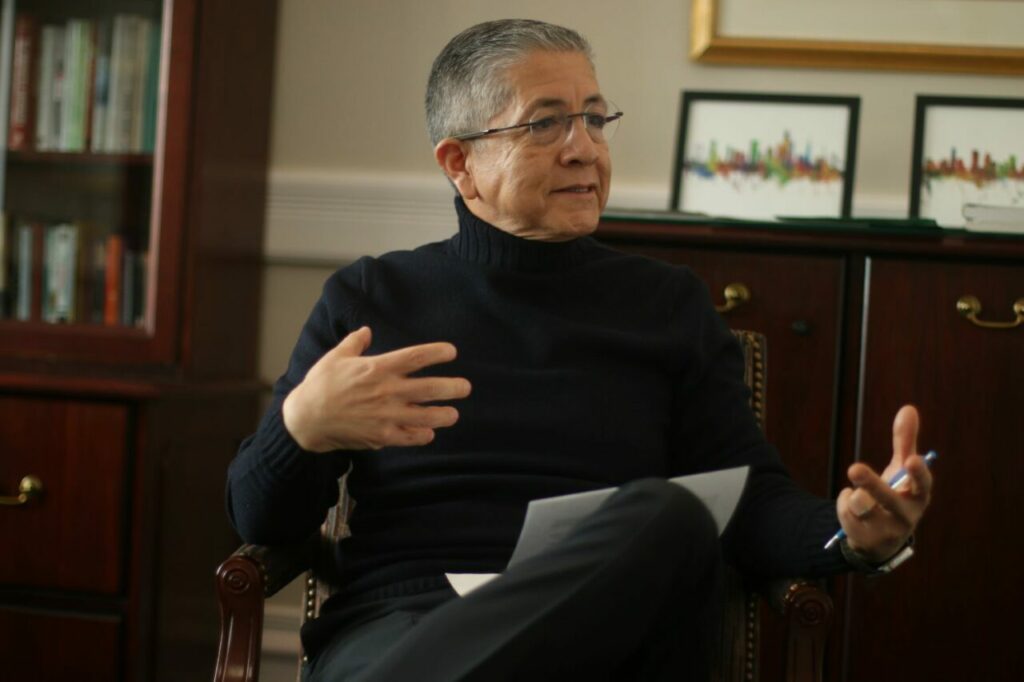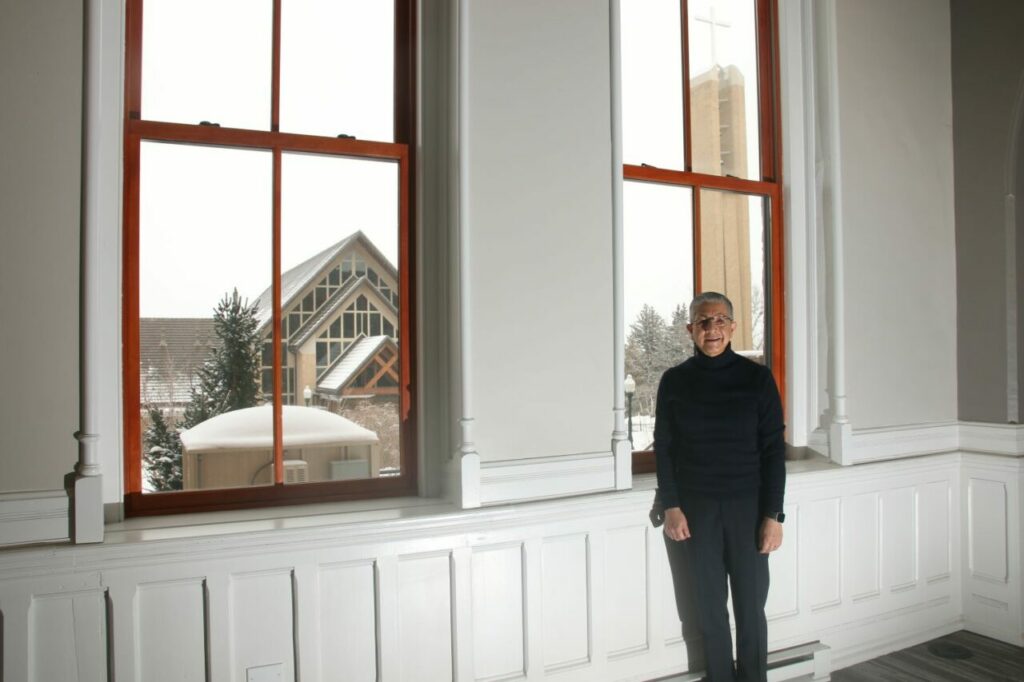By Morgan Jacobus
Salvador D. Aceves, Ed.D. officially stepped into his role as Regis University president on Jan. 1. To welcome him and help the community get to know him better, we sat down with Aceves for a Q&A.
Before being involved with Regis, Aceves was already familiar with it as an innovative institution. He spent most of his career at the University of San Francisco, which is where he met Regis’ prior president, Rev. John P. Fitzgibbons, S.J., and started developing a friendship.
When it came time for Fitzgibbons to build his cabinet at Regis, he reached out to Aceves to offer him the role of chief financial officer.

“It’s been a great journey,” Aceves said. “One of the things you discover being part of the Jesuit higher education is that so much of our relationships are grounded in friendships and trust, and all the things that really are so critical in building a team.”
Aceves added his goal is to ground Regis’ education in its mission, and to “ensure that we craft what I’m calling a human-centered strategic plan that really draws on the distinctiveness of the university.”

The Denver North Star asked Aceves what being the first Latino president at Regis means to him.
“It’s both inspiring and humbling,” he said. “I think it’s a validation of what I will ground as the American Dream in many ways. My parents came here as immigrants, first-generation college students. When I reflect on all of the people who’ve really played such critical roles in my own career, I see that as what a marvelous way to hopefully signal to others that hard work, dedication and commitment really does provide the kind of opportunity that so many of our citizens and immigrants come to this country for.”
Aceves described a similar feeling when Regis hosted 100 students from Arrupe Jesuit High School, many of whom are Latino.
“I could sense that there was a real sense of support and pride in the fact that we have a shared culture here,” he said. “I think that will be both inspiring and supportive to know that this is a university that welcomes our Hispanic students, our students of color, to build a diverse and inclusive community.”
Regis has a Hispanic-Serving Institution plan to assist students to become part of the university community. “It’s not just the numbers; it’s creating the environment for students to feel welcome … how we engage their family, because they’re such a big part of the support and what these students turn to,” Aceves said. “So, (we must) figure out how we are best serving and how … those practices extend to welcome students of all cultures is our internal work, and I think that’s how we’re going to not only welcome but also be able to support and sustain our diverse student body.”
As Regis University’s first permanent lay president, meaning he is not a priest, Aceves said he plans to engage the Catholic Church community in listening sessions, which are going to feed into the strategic plan. The pillars of the plan come out of the Mission Priority Examen, which includes faculty, staff and students.
The governance component includes “focus groups to address the faculty, staff and student experience, to focus on our operational experience and to also focus on community relations… In the end, it’s not about senior leaders trying to figure out solutions, it’s actually the whole campus engaging with the campus as well,” he said.
Further, Aceves has reached out to the Regis University Student Government Association (RUSGA) and met with Student Body President Madelaine Johnson. He discussed the importance of involving RUSGA, particularly Johnson.
“We’re in this together. I want to make sure that not only are we spending time with you and your team, but I also want to invite you to these groups, because there will be times where there are student concerns,” he said. “I need to know what those are, but I also need you to help us figure out how to solve these so there is this continual dynamic for us to be in conversation. … I’m very concerned about ensuring that our students are supported, that they’re getting the services that they need and that the services are available.”
When asked about what he hopes students will gain from their time at Regis, he said, “We talk about a student-centered, formative education, by that I mean one that’s grounded in Jesuit Catholic values. One that is grounded in providing students the skills and the passion to go into the world, and, as we say in our mission statement, make this world a more just and humane place.”
Aceves recently had a couple experiences that allowed Regis to draw the community into a lived-mission experience, one of which was welcoming the SOS (safe outdoor space) community. More recently, Regis welcomed families from Venezuela.
On his first day on the job, Aceves received a call from the mayor’s office, which was responding to a humanitarian crisis. The families were on the pathway to another city but had arrived in Denver where they received temporary shelter from Regis during their transition.
Regarding Regis’ plans to develop 27 acres of its campus, which will include multifamily housing, Aceves said the university is still looking at what kind of subsidized and student housing it may make available.
“We are still at the conceptual phase as we work within our community and city on the entitlement process,” he said. “While we do not have specific percentages, we are committed to a project that is affordable and accessible to our community.”
Aceves is also interested in providing rental properties to seniors, as well as bringing an identity of north Denver.
“I’m excited and grateful. As we look beyond what post-COVID looks like, I really feel that we have such a great opportunity to continue to build and expand what it means to provide a Jesuit Catholic education,” Aceves said. “The goal here is to ensure that we are drawing a diverse, inclusive community that I feel is going to make north Denver and Denver as a whole in our state the kind of place we all want to be a part of.”

Be the first to comment